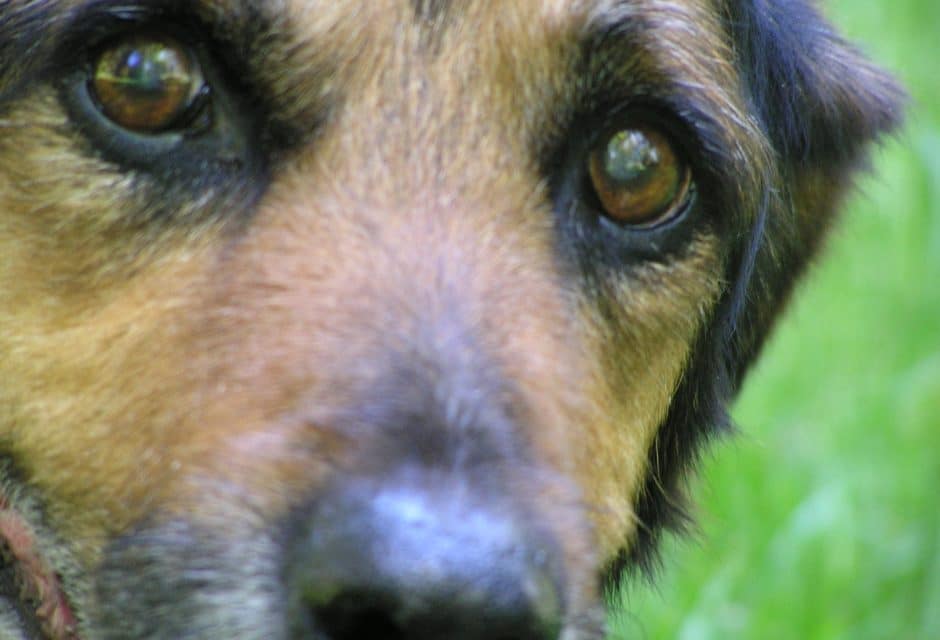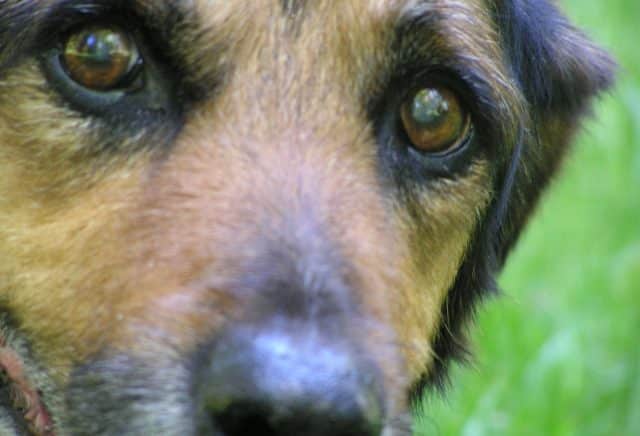

How to Get Your Dog to Live Forever, Almost
I’ve had pretty good luck getting big dogs to live sixteen or more years. My old super dog Lou lived to be sixteen, despite his Rottweiler/Shepherd genes telling him otherwise. From the time I found him running feral in 1989 in the Mendocino pot fields, to the last day of his life here in Seattle in 2005, he barely ever called in sick. Apart from cancer surgery at thirteen and degenerative myelopathy late in life, he’d been as hardy as a brick. I’d fed him a quality lamb-and-rice kibble, plus raw chicken necks (microwaved for thirty seconds) and leftover human food- chicken or salmon skin, organ meats, stale bread, eggs- whatever was around. No vitamins or special supplements, no spring water, no home-cooked extravaganzas. He ate anything I gave him, and was healthy, fit, and grateful.
Flavio, my current sixteen year-old, is an impossibly long, lanky, furry shepherd/chow mix who turns seventeen in August. I’ve had him for about fourteen years or so; he just showed up one day and never left. He’s taller and longer than Lou was, but about the same weight- seventy five pounds, give or take. The only medical issue he’s ever had was emergency back surgery to treat a blown disk when he was around ten, thanks to Rico the crazy pit mix puppy leaping onto Flavio’s back too many times. Flavio too has eaten a good kibble, with chicken necks, skin and organ meats, and whatever else might have been aging in the fridge. He loves to eat, albeit more slowly than the average dog. He seems to savor more. He’s reflective. Again, no supplements until just recently- a glucosamine tablet each day, which either works or doesn’t. He’s got that stiff legged, “high-heel” walk now, and he takes a while to get up or lie down. But he is going to be seventeen, which frankly is amazing.
I’ve been trying to reason out the secret to these two boys’ longevity, and have come up with a few things. Decent food is key, but, even more than that, the amount of food I think plays a vital role in longevity. I purposely underfed them, compared to what other owners fed dogs of similar size. They ate once per day during adulthood, and never received more than two cups of kibble per day, plus whatever else I added to it. This amounts to about 2/3rds of what other dogs ate. I believe strongly that this “underfeeding” maintained them at an optimal weight, one which allowed just a hint of rib, if you understand me. While other big dogs were scarfing down three or four cups of food, twice per day, my guys adapted to fewer calories, and looked and felt fine. This “caloric restriction” is, I believe, one of the keys to getting a bigger dog to live a long time.
Additionally, I practiced a feeding technique I learned decades ago from a training mentor, who always soaked her dogs’ food in warm water for ten or fifteen minutes before serving it, on the premise that it reduced the chances of bloat, a deadly condition that kills big dogs. She believed that big dogs who eat lots of dry kibble will have that food appreciably expand in their guts, and cause a buildup of gastric pressure that can cause bloat. By soaking and expanding the kibble beforehand, she believed she avoided the danger. This of course is an entirely anecdotal and unproven concept; but I have have followed it for twenty-five years, with training dogs and with my own, and never had an incident of bloat.
I cannot, of course, take credit for their genes. Clearly, both of these mutts hit the jackpot in this area, taking advantage of the concept of “hybrid vigor” big time. Purebred dogs, though beautiful, functional, and predictable, all run the risk inherent to a smaller gene pool. Match up two recessive genes for some unfortunate condition, and a Golden, Doberman or Great Dane will live a shorter life. The chance of this happening with a mutt is much lower, and so Lou and Flavio again lucked out.
Both dogs, especially Lou, got ample exercise, within reason. I did not make them jog ten miles each day, run daily agility, or participate in jarring or potentially hazardous activities (except when Lou would take it upon himself to catch criminals, break up robberies, or protect me from the occasional mad dog). Overall, I think reasonable amounts of exercise are another key to longevity.
Purpose is another. I think a dog with purpose looks forward to the day, and the next, and the next. Whatever that purpose might be- a daily hike in the woods, a routine round of Frisbee toss, a swim in the lake- I think it gives dogs something to live for. Even when they are hampered by arthritis or the early stages of cardio/pulmonary disease, they keep getting up and looking forward to the routine that defines them. Anecdotal, I know, but that’s my read on it.
Though I make sure my dogs have the proper vaccinations, I never get them vaccinated every year, and will often wait years to get them taken care of (except the mandatory three year rabies shot). The reason is simple, yet controversial; over-vaccinating pets can I believe lead to an overstressed immune system, and even serious disorders such as sarcoma, or thyroid issues. I have participated in titer testing- a blood test that can determine a dog’s level of antibodies to a particular infectious disease- and know that, though informative, it does not always accurately portray real life levels of immunity. But I firmly believe that “booster” shots every year are completely unnecessary, and even potentially harmful. My dogs get them around the five year period, and, once they top twelve or thirteen, all but the rabies vaccination are stopped. I know veterinarians reading this are probably having kittens, but, sorry, that’s my experience.
I have also been a huge stickler on off-leash training, and on teaching a rock-solid recall command. Too many people lose their dogs early because of car accidents, or because a dog simply ran off without listening. You MUST train your dogs to come on command, and to behave off leash, if you want them to live a long, happy life.
Love is important too- old age requires it. But more than that, longevity requires ritual, routine, dependability, and doggish sensibility on the part of owners. Not spoiling, over-nurturing, undertraining or humanizing, but simple respect for what dogs need. And, besides your companionship, I think another key to dog endurance is having a younger dog around, for the older dog to mentor. Having a youngster around creates a sense of responsibility for the elder, which I believe helps prolong, and invigorate. And the youngster will keep the old dog moving, playing, and competing. I can’t imagine ever having only one dog.
Lou is gone, and Flavio, at nearly seventeen, won’t be around much longer. But Rico is only seven, which in our house is barely out of the cradle. Some day he’ll be the elderly mentor to another, and then it to another, and so forth, until I’m the one walking stiff-legged and sleepy, waiting for my next meal as if it were the grail.
Join the newsletter and never miss out on dog content again!
"*" indicates required fields
By clicking the arrow, you agree to our web Terms of Use and Privacy & Cookie Policy. Easy unsubscribe links are provided in every email.